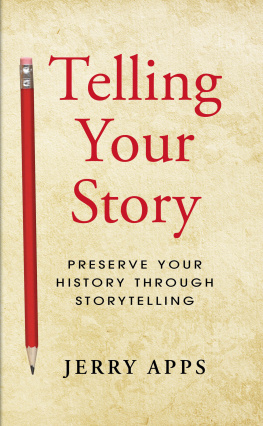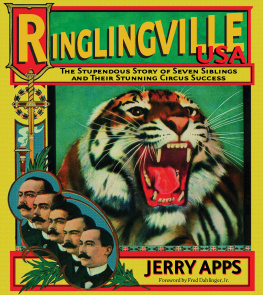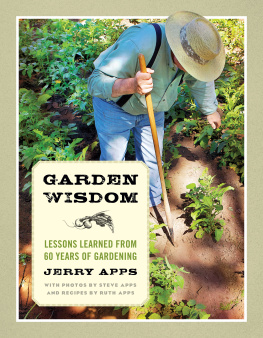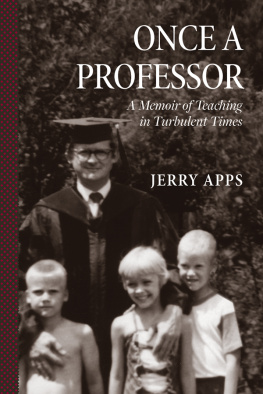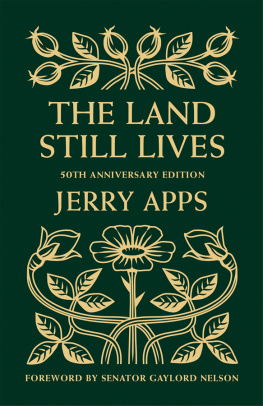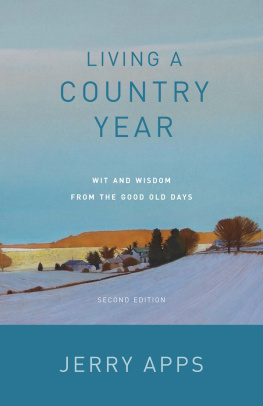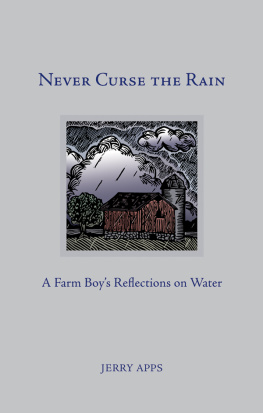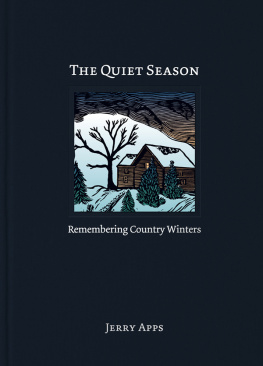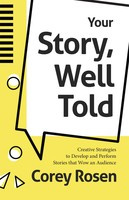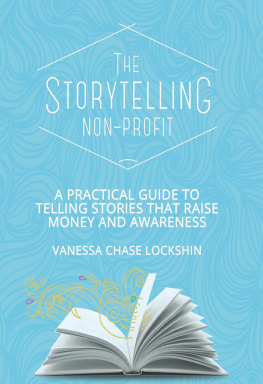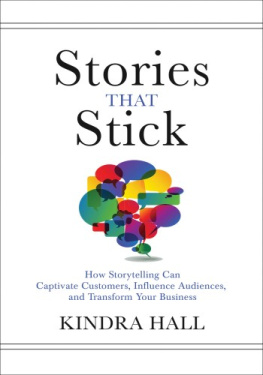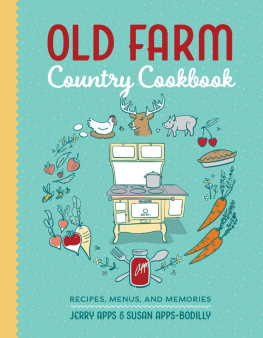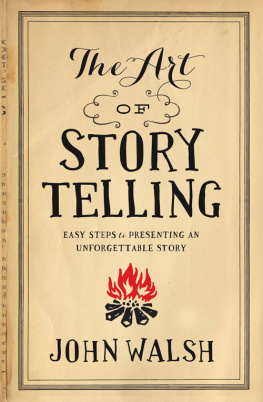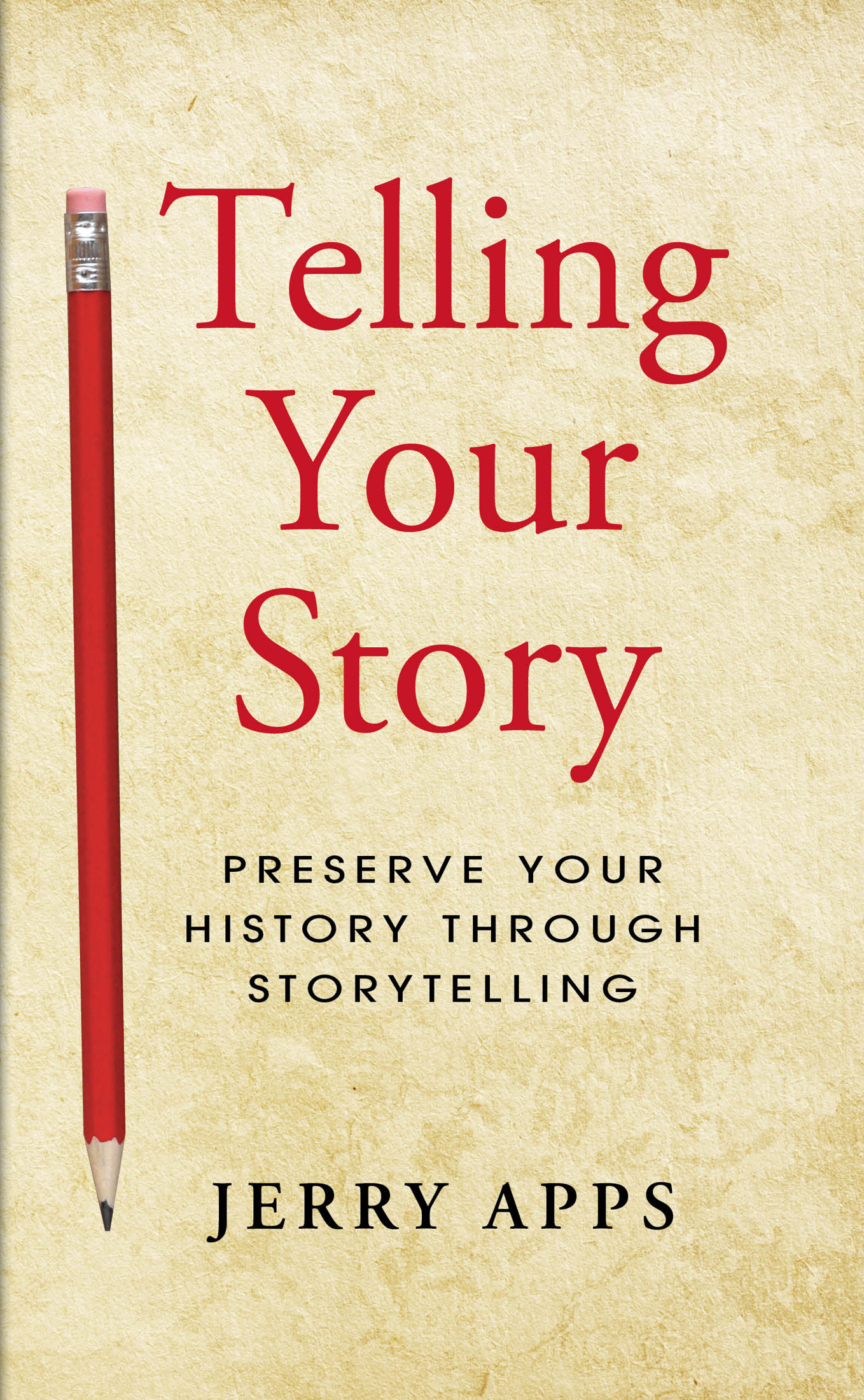Telling
Your
Story
Preserv e You r
Histor y Throug h
Storytellin g
Jerry Apps
2016 Jerry Apps
All rights reserved. No part of this book may be reproduced, stored in a retrieval system, or transmitted in any form or by any means, electronic, mechanical, photocopying, recording, or otherwise,
without written permission from the publisher.
Library of Congress Cataloging-in-Publication Data
Names: Apps, Jerold W., 1934- author.
Title: Telling your story / by Jerry Apps.
Description: Golden, CO : Fulcrum Publishing, 2016.
Identifiers: LCCN 2016019291 | ISBN 9781938486234 (paperback)
Subjects: LCSH: Autobiography--Authorship. | Biography as a
literary form. |
BISAC: LANGUAGE ARTS & DISCIPLINES /
Composition & Creative Writing.
Classification: LCC CT25 .A66 2016 | DDC 808/.06692--dc23
LC record available at https://lccn.loc.gov/2016019291
978-1-938486-23-4
Printed in the United States.
Fulcrum Publishing
4690 Table Mountain Drive, Suite 100
Golden, Colorado 80403
(800) 992-2908 (303) 277-1623
www.fulcrumbooks.com
Why Tell Your Story?
My father and my uncles were storytellers, and so were several of the neighbors in the farming community where I grew up in central Wisconsin. Family members told stories when we gathered for celebrations, birthday parties, anniversaries, and at Christmas and Thanksgiving family affairs. Our farm neighbors told stories during threshing and wood sawing bees, while they waited at the grist mill for their cow feed to be ground, and when they came to town on Saturday nights and waited for their wives to grocery shop. These stories were always entertaining, as many of them had a humorous bent to them, but they also were filled with informationhow the cattle were surviving during the summer drought, what price Sam got for his potato crop and how he managed to get that price. How the weather this year was not nearly as bad as the weather twenty years ago. Many of the stories were also sad, such as how Frank was making it on his poor farm since his wife died and left him with three kids to feed and care for.
I heard some of these stories many times, each told a little differently when it was shared, but enjoyed as much as the time before. When I graduated from college in 1955, I began a long career as a teacher. I was soon telling stories as a teaching method. As the years passed, I discovered how much I enjoyed telling my stories, both in written form and spoken in front of an audience. I also discovered that people enjoyed my stories when I shared them on radio and television.
In 1999, I was in New York City as part of an international group discussing the arts for people over age 50. The week-long session, sponsored by the American Association of Retired Persons (AARP) and UNESCO, the educational arm of the United Nations, focused on developing suggestions for how middle-aged people and older could become more involved in the arts, and how they and the world might benefit from them doing so. We discussed sculpting and painting, dance and folk artsand storytelling. I was in the storytelling group, and we discussed and made several suggestions about the importance of storytelling and how to encourage people to do it.
Each sub-group was asked to select a spokesperson who would present the groups report to the United Nations delegates at the end of the week. I was selected to give the storytelling groups report and I never forgot the experience. Here I was, at the podium in the beautiful United Nations building, looking out over a sea of delegates, many wearing headphones that provided them with a translation to their own language of what I had to say. Sitting close behind me was Kofi Annan, then Secretary General of the UN. I had fifteen minutes to deliver my message.
I dont recall the exact words I used, but I tried to convey that storytelling and stories were as old as humankind and that they remained important and could make many valuable contributions. I couldnt tell by looking at the audience if they agreed with me, disagreed with me, or just didnt care. When I finishedmine was the last in a series of brief talks about the artsI left the podium and stepped off to the side. I noticed that several delegates had lined up to talk with me. I expected to hear such things as: You were talking about an earlier day when people had time to share stories. Today the events of the world move too rapidly for storytelling. I expected someone to say, Todays world requires more modern ways of communicating, and storytelling ought to be relegated to history.
But thats not what I heard. The first person thanked me for sharing the importance of storytelling, as did the second, who went on to say that it was as important today as it has ever been, perhaps even more so.
But what the third person said has stayed with me most clearly. A woman from an African country that I cant remember looked me right in the eye and said, In my country, we have known the power of stories for generations; we know their importance and we encourage their telling. Continuing without a hint of a smile, she said, You people have allowed others to tell your story. Youve allowed novels, TV, and the movies to tell your story.
I didnt know how to respond, for at that moment with the words you people, I apparently represented everyone in the United States. I didnt know how to respond because I knew she was right. We have become enamored with the stories on TV, in the films that we see, and the novels that we read. We have come to believe that our individual stories and their telling no longer matterthat they somehow are irrelevant in the larger scheme of things.
By 1999, I had been involved for nearly 30 years in teaching writing workshops designed to help people get in touch with and write their own stories. I had also published several books that included my personal stories. When I taught graduate courses at the University of WisconsinMadison, I regularly used storytelling as part of my teaching approach. But during my last several years of teaching at the university, I had come to doubt the importance of stories and storytelling. In fact, one of my university colleagues told me, Students these days dont have time for storiesthey want the information they need to succeed in their fields as efficiently and quickly as possible. There is no time for storytelling. Another colleague was even more blunt. He said, Apps, if you didnt spend so much time writing and telling stories, you might amount to something.
This is why what the African UN delegate said to me resonated so strongly. She affirmed what I already knew: that stories and storytelling were important, and that we in the United States have indeed allowed others to tell our stories. From that day on, I never wavered in my zeal for writing and telling stories, and helping others write their stories. I have long known how important stories are to me, to my family, and for those who live in my community. Through my writing workshops, I have seen the power of stories and storytelling come alive in front of me as participants wrote their stories and shared them.
Now my challenge became how to encourage others to tell their stories. One way to do this was to help people see what telling their individual stories could accomplish, and why personal stories can be one of the most valuable things a person possesses. Nancy Lamb said it well when she wrote, I believe we look to story for a connection to our past. Story reaches beyond the written word to create an unconscious continuity with our earliest ancestors, as well as with future generations in making these connections, we honor where we came from, who we are, and what we can become.

